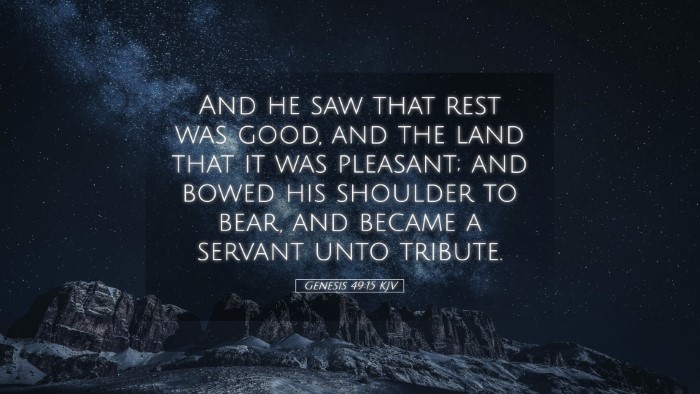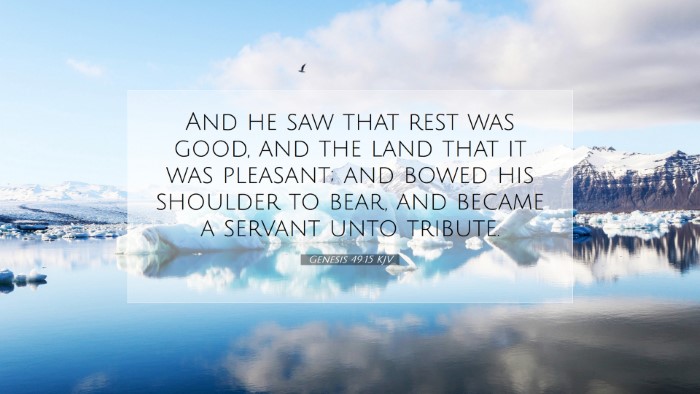Commentary on Genesis 49:15
Verse: "And he saw that rest was good, and the land that it was pleasant; and bowed his shoulder to bear, and became a servant unto tribute."
Introduction
Genesis 49:15 is part of Jacob's prophetic blessings to his sons. This verse specifically addresses Issachar, reflecting on themes such as rest, servitude, and the consequences of choices. The complexity of human existence and divine providence is woven into this passage, making it a rich subject for theological reflection.
Contextual Analysis
Understanding Genesis 49 requires a grasp of Jacob's life and his relationship with his sons. As Jacob assembles his family for a final blessing, he speaks prophetic words that resonate not only with his immediate descendants but also with future generations. Issachar's blessing illustrates the tension between ease and obligation, between the pursuit of comfort and the call to labor.
Commentary Insights
1. Matthew Henry's Perspective
Matthew Henry notes that Issachar's name is associated with the "reward," indicating the importance of labor in achieving rest. He comments that the good land represents the blessings that come with diligence. This perspective emphasizes the interconnectedness of work and reward in the spiritual life:
- Issachar's choice to embrace labor signifies a noble pursuit of good things.
- The phrase "rest was good" reflects a state of satisfaction that comes from labor well done.
- This blessing can parallel the Christian understanding of the 'rest' in Christ, achieved through earnest labor in faith.
2. Albert Barnes' Commentary
Albert Barnes highlights the dual aspects of Issachar's fate: the physical land that promised rest and the servitude that followed. Barnes argues that the comfort found in ease can lead to a willingness to engage in servitude:
- He points out that the land's pleasantness symbolizes opportunities that, while attractive, may lead to a loss of autonomy.
- Issachar’s choice reflects a reality where ease can become a chain, trapping one in servitude rather than leading to freedom.
- The tribute referred to implies a yielding of independence in exchange for comfort, a theme often relevant in modern contexts.
3. Adam Clarke's Insights
Adam Clarke offers a detailed etymological analysis of the terms in this verse. He posits that the phrase "bowed his shoulder to bear" implies a resignation to hard work:
- Clarke emphasizes that Issachar's acceptance of labor was not merely a passive act but one infused with purpose and intention.
- The commentary underscores a broader theological notion: that divine blessings are often intricately linked to our readiness to toil.
- Clarke ties the notion of tribute to a spiritual discipline of giving—suggesting that true rest comes when one serves others willingly.
Themes and Applications
1. The Nature of Rest
The passage raises essential questions about the nature of rest. Is true rest possible without labor? The biblical narrative often intertwines the two, promoting a theology that values both diligence and the resultant peace that comes from fulfilling one's purpose.
2. Choices and Consequences
Issachar's decision to submit to labor mirrors the choices faced by believers today. While the allure of rest may compel many to seek ease, scriptures consistently remind us that meaningful achievements often come at a cost. This raises a vital discourse on the nature of servanthood within the Christian life.
3. Spiritual Reflection
The passage invites believers to reflect on their own responses to God’s calling. As Issachar embodied a servant spirit, so are Christians called to engage actively with their communities, providing support and bearing burdens, all while seeking divine rest and peace.
Conclusion
Genesis 49:15 serves as a poignant reminder of the balance between rest and labor. The reflections from Matthew Henry, Albert Barnes, and Adam Clarke enrich our understanding of this verse, making it applicable across generations. For pastors, students, theologians, and Bible scholars, the themes encapsulated in this text challenge us to embrace our responsibilities, understanding them as pathways to true fulfillment in both the temporal and eternal realms.


